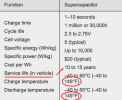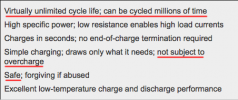BTW, rechargeable battery life is usually defined by manufacturers as the number of full charge-discharge cycles, not the number of years it will last. For example, a typical laptop battery is usually rated for 300-500 cycles. Of course, the cycle life is shortened if the battery ages prematurely due to stress. The number of charge/discharge cycles in a typical dash cam lithium-polymer (ion) battery, along with the numerous stressors encountered in an automotive environment far exceed most other uses for these types of batteries.


